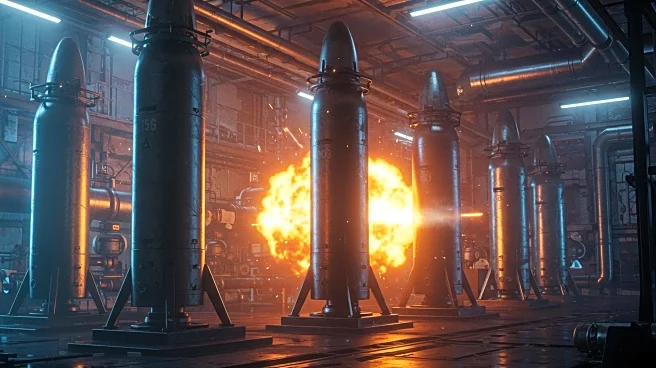What's Happening?
On August 11, Ukrainian Defense Intelligence (HUR) conducted a drone strike on the Orenburg Helium Plant in Russia, the sole facility producing helium crucial for missile manufacturing, space technology, and aviation. The plant, located in Orenburg Oblast near Kazakhstan, is approximately 1,200 kilometers from Ukraine's front line. The attack resulted in significant explosions, leading to the closure of a section of the federal M-5 highway. The helium plant processes about 15 billion cubic meters of natural gas annually, playing a vital role in Russia's military capabilities. This strike is part of Ukraine's broader strategy to target Russia's military-industrial complex, including a recent attack on the Arzamas Instrument-Building Plant in Nizhny Novgorod, which supplies components for cruise missiles used against Ukrainian cities.
Why It's Important?
The drone strike on the Orenburg Helium Plant represents a strategic blow to Russia's missile production capabilities, potentially disrupting its supply chain for missile systems and aerospace production. Helium is essential for various military applications, and its production halt could impact Russia's ability to manufacture and deploy missiles effectively. This action underscores Ukraine's tactical use of drones to weaken Russia's military infrastructure, aiming to reduce the frequency and effectiveness of missile attacks on Ukrainian cities. The strike may also influence international perceptions of the conflict, highlighting Ukraine's ability to target critical Russian facilities deep within its territory.
What's Next?
Following the strike, Russia may seek to enhance its air defense systems to prevent future drone attacks on key facilities. Ukraine is likely to continue targeting strategic sites within Russia to disrupt its military operations. The international community may closely monitor these developments, potentially affecting diplomatic relations and military support dynamics. Russia's response could involve increased military actions against Ukraine or efforts to secure alternative sources for helium and other critical components.
Beyond the Headlines
The attack on the helium plant raises questions about the ethical implications of targeting civilian infrastructure with military significance. It may lead to discussions on international law regarding legitimate military targets and the balance between military necessity and civilian impact. The strike could also prompt Russia to reassess its industrial security measures and explore technological advancements to safeguard critical facilities.











